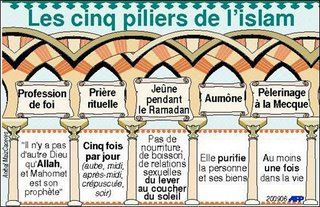
Yesterday Ramadan, one of the five pillars of Islam, started for the Muslims in France, as it did for Muslims across the globe --- one month during which certain customs are kept, the month which commemorates the revelation of the Qoran, the ninth month of the Muslim lunar calendar.
Last Friday, Dalil Boubakeur, the rector of the big mosque of Paris and president of the French Muslim Council (CFCM) announced that Ramadan would start on 24 September this year -- the year 1427 AH, according to the Muslim reckoning. The exact date is calculated according to the positioning of the stars and planets.
"Nous souhaitons aux croyants un heureux Ramadan -qui est un mois de bénédiction et de patience-, dans l'espoir de la miséricorde divine et de la paix.
Nous implorons Allah pour qu'il accepte notre jeûne et qu'il nous comble de Sa Clémence et de Sa Miséricorde durant ce mois béni du Ramadan", écrit le docteur Boubakeur dans son communiqué", was Dr. Boubakeur's wish for all Muslims in France at the onset of Ramadan.
What then is the current situation of Muslims in France?
In an article in Le Figaro on 20 September 2006, entitled "European Islam: Democracy and the 11 September earthquake", Laure Mandeville writes:
.........."And yet it is four decades since Islam "came to the West" and immigrant Muslim populations set down roots throughout Europe. But until 11 September 2001 nobody was interested in their degree of integration. Apart from the far right, which was already capitalizing on this theme, the Europe that had lapsed into "neglect of God," to quote Benedict XVI, naively thought that the West's consumerist and libertarian model would prevail over religious and cultural tensions.
But that was before the rude awakening of 11 September. This, because the revelation of the West's vulnerability to the threat from political Islam sparked a debate that is repeated in all European countries, whatever their model of integration. The Netherlands, which seemed like a "multicultural paradise", has been undergoing an outright intellectual revolution since the emergence of the Pim Fortuyn phenomenon, the libertarian homosexual politician who launched the debate on the "invasion of Islam" and its compatibility with Western values, before being assassinated in 2002. Britain, which shares with the Netherlands a very liberal community model, is also wondering about the limitations of a multiculturalism that leads to the segregation of communities. Even the earthquakes shaking these countries' intellectual landscape interact. In France, as in Britain or the Netherlands, the Jewish and secular left is shifting to the right, where it is forming alliances with Christian parties, as in the case of editorialist Melanie Phillips, who has switched from The Guardian to the Daily News [as published], and who is now accused of Islamophobia. Division along community lines is now becoming established both on the Internet and in people's minds.
In this connection France seems to enjoy a small advantage, on account of its secular and republican model, which gives citizenship priority over ethnic or religious origins. From the Dutch or British vantage point, it is even regarded with envy. A recent survey published by the Pew Institute also lends support to France's position: whereas 88 per cent of Britain's Muslims feel more Muslim than British, the figure is 48 per cent in France.
Though this is a much better result than Britain's, the survey nevertheless reveals that half our Muslims have an Islamic rather than French identity. "The urban riots showed that you are by no means immune, even if you have had no attacks," according to Sadiq Khan, a British deputy or Pakistani origin. "You are indeed in the Middle Ages compared to us, in terms of Muslims' representation. Where are your Muslim deputies, senators, business chiefs and intellectuals?"
Far from denying this, France acknowledges that there are "things to be taken" from its neighbours, in connection with positive discrimination, for instance. One sign of the times is the fact that the debate on "the need to Europeanize Islam" is emerging in France, as it is elsewhere. Institutions intended to train European imams are being founded. Everywhere the watchword is the same: to ensure that the vast majority of Europe's 32m Muslims show solidarity with our national communities.
The five pillars of Islam are The Testimony of Faith (Shahadah) - the declaration that there is none worthy of worship except Allah and that Muhammad is His last messenger;
Ritual Prayer (Salat) - establishing of the five daily Prayers; Obligatory almsgiving (Zakat); Fasting Sawm; and The Pilgrimage to Mecca (Hajj)
The name Ramadan derives from the Arabic word for intense heat and sun-scorched ground --- probably as it refers to the hot, dry sensation of thirst during this month of fasting, Ramadan scorches out evil like the sun scorches the earth and just as heat shapes and influences all matter — organic and inorganic — so does Ramadan shape and influence the believer.
All devout Muslims who observe Ramadan fast from sun rise to sunset every day during this month, as the Qoran mandates this. Fasting aims to develop patience and self-control, learn sympathy for the deprived, cleanse the body and mind, gain appreciation for Allah's bounty, demonstrate the depth of one's commitment and protect against sin.
A hadith states: "Satan runs in the circulatory system of the son of Adam in the same way blood circulates in our system; so tighten his passages with hunger."
We wish all our Muslim readers well over this period : Ramadan mubarak!
Click on Link:
Chateau Lalinde : The perfect venue for your event
TAGS: Events Rent a chateau France
Chateau
Perigord Food Holidays in France Recipes



